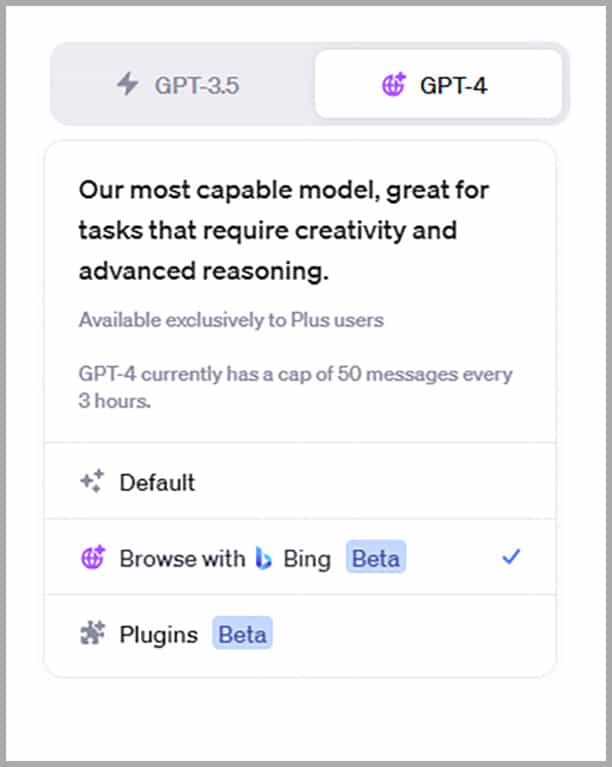Follow along with Sharon Nelson, John Simek and Michael Maschke as they explain how AI tools are revolutionizing the legal industry and what that means for users.
AI tools are revolutionizing the legal industry by enhancing efficiency in various tasks like document drafting, legal research, and marketing. These technologies can significantly reduce the time and effort required for routine tasks, allowing legal professionals to focus on more complex issues. However, it is important to maintain human oversight and proper fact-checking to mitigate any risks associated with their implementation in legal practices.

Table of contents
- Introduction to ChatGPT for Lawyers
- Hurray! ChatGPT Now Has Current Data with AI Tools
- How Do You Get ChatGPT to Browse Bing?
- Meta Confesses That the Meta AI Chatbot Was Trained on Public Facebook and Instagram Posts — Both Texts and Photos
- Applications of ChatGPT in Law Firms
- Securing AI: Ethical Considerations
- More on ChatGPT for Legal Research
Lawyers complained that ChatGPT was not entirely useful to them because it was limited to data prior to September 2021 — a huge limitation for an attorney doing research or anything requiring access to data after 2021. It really prevented a lot of lawyers from using ChatGPT in any major way.
Good news: ChatGPT can now browse the internet.
Introduction to ChatGPT for Lawyers
ChatGPT is a revolutionary AI-powered chatbot that is transforming the legal profession. Developed by OpenAI, ChatGPT uses natural language processing to respond to questions and generate content for users. In the legal industry, ChatGPT has the potential to automate routine tasks, improve efficiency, and enhance the overall legal practice. This introduction will provide an overview of ChatGPT and its applications in law firms.
Hurray! ChatGPT Now Has Current Data with AI Tools
We have been stymied time and again by not having current data from ChatGPT. But this week we were able to ask ChatGPT how Congress came to pass a short-term budget bill to avoid a government shutdown, and it had all the most current information.
ChatGPT’s ability to access current data can help automate legal tasks, thereby boosting efficiency for lawyers.
We could even determine what reliable sources are saying about the possibility of passing a new budget: “The likelihood of Congress passing a new budget before the short-term budget bill expires seems uncertain.” And it told us why. Importantly, we could also see which sources it was consulting and that they were all well-respected ones.
To further test-drive it, we asked for the most significant legal news on October 2, 2023, at noon. ChatGPT chose the lawsuit against Amazon by the Federal Trade Commission and 17 states, which alleges Amazon abuses its market position to inflate prices, overcharge sellers and stifle competition. Significant news indeed.
It was hard to stop playing with ChatGPT to pen this article!
How Do You Get ChatGPT to Browse Bing?
For author Nelson, that was the hardest part to figure out — which is where author Simek proved very useful. Here’s how you do it — and remember that, for the moment, the update is available only to premium users on ChatGPT’s “Plus” and “Enterprise” plans. However, OpenAI says the update will “expand to all users soon,” but it did not give the timing of the update’s rollout.

First, you have to “turn on” the ability for ChatGPT to access the internet by configuring it to browse using Bing.
- From the main screen, click on the GPT-4 button at the top and click on the “Browse with Bing” option.
- A checkmark will display next to the option to let you know ChatGPT will now use Bing to get to the internet for current information.
Why did Bing get picked as the browser?
Well, Microsoft owns 49% of OpenAI. Is the picture clearer now?
Add this to the fact that ChatGPT can now “speak,” listen and process images and you have a well-rounded tool at your command.
Meta Confesses That the Meta AI Chatbot Was Trained on Public Facebook and Instagram Posts — Both Texts and Photos
This September 2023 revelation did not sit well with a lot of people, including lawyers. Meta AI is still in beta and Meta said it excluded private posts shared with family and friends to preserve consumers’ privacy.
Ethical considerations are also crucial when using AI technology, specifically ChatGPT, within the legal profession. While AI can enhance productivity for lawyers, it raises important ethical questions that need to be addressed to ensure responsible use in legal practices.
Meta President of Global Affairs Nice Clegg said, “We’ve tried to exclude datasets that have a heavy preponderance of personal information.”
Meta, Open AI and Alphabet’s Google have all been severely criticized for scraping data from the internet without permission to train their AI models.
As readers are likely aware, many book authors have filed lawsuits against these companies alleging that they are guilty of copyright infringement. It will be very interesting to see the outcomes of these lawsuits.
Applications of ChatGPT in Law Firms

ChatGPT has numerous applications in law firms, ranging from drafting legal documents to conducting legal research and analysis. Here are some of the key applications of ChatGPT in law firms:
Drafting Legal Documents
ChatGPT can assist lawyers in drafting legal documents such as contracts, agreements, and pleadings. By using ChatGPT, lawyers can save time and effort in drafting legal documents, which can be reviewed and edited by human lawyers to ensure accuracy and relevance. ChatGPT can also help lawyers to identify relevant case law and legal precedents, which can be used to support their arguments.
Legal Research and Analysis
ChatGPT can conduct legal research and analysis, providing lawyers with relevant information and insights. ChatGPT can search through vast amounts of legal data, including case law, statutes, and regulations, to provide lawyers with accurate and up-to-date information. This can help lawyers to conduct legal research more efficiently and effectively, saving time and effort.
Client Communication and Support
ChatGPT can also be used to improve client communication and support. ChatGPT can assist lawyers in responding to client inquiries, providing basic information and support. ChatGPT can also help lawyers to draft client communications, such as emails and letters, which can be reviewed and edited by human lawyers to ensure accuracy and relevance.
By leveraging ChatGPT, law firms can improve their efficiency, productivity, and client satisfaction. However, it’s important to note that ChatGPT is not a replacement for human lawyers, but rather a tool that can assist lawyers in their work. As the legal industry continues to evolve, it is key for lawyers to stay up-to-date with the latest technological advancements, including ChatGPT.
Securing AI: Ethical Considerations
A lot of lawyers have asked about securing AI. From the lawyer’s point of view, you should always designate your conversations with AI as private and not to be used for training.
Disabling Chat History in ChatGPT for Legal Documents
For ChatGPT, which is what we use, you disable your chat history and opt out of having your ChatGPT data used to improve the models — you toggle the Data Controls setting “Chat History & Training” to OFF, whether you use the free or paid version of ChatGPT.
There Is Some AI Security Lawyers Cannot Control
For instance, AI companies struggle with such things as training data poisoning. Malicious actors can feed the AI tool flawed data or corrupt legitimate training data. This is obviously beyond the lawyer’s control, but lawyers must be aware of the possibility that the AI output may be corrupted.
AI companies are aware of the dangers and, presumably, acting to monitor for data poisoning and other AI security hazards.
There are many guides to implementing a secure AI framework that are entirely beyond the understanding of most lawyers. This is why we recommend that lawyers use ONLY AI that has established a reputation for security. (See our Attorney at Work article “Beware of Ethical Perils When Using Generative AI.”)
As law firms begin rapidly using AI, training law firm employees on the use of AI is becoming a critical component of law firm security — and training is too often omitted. While that’s another column entirely, be mindful of the dangers of failing to train.
When working with AI, it is often asked, “What could possibly go wrong?” The answer is a lot.
Sharon D. Nelson is a practicing attorney and the president of Sensei Enterprises, Inc. She is a past president of the Virginia State Bar, the Fairfax Bar Association and the Fairfax Law Foundation. She is a co-author of 18 books published by the ABA. snelson@senseient.com.
John W. Simek is vice president of Sensei Enterprises. He is a Certified Information Systems Security Professional (CISSP), Certified Ethical Hacker (CEH) and a nationally known expert in digital forensics. He and Sharon provide legal technology, cybersecurity and digital forensics services from their Fairfax, Virginia, firm. jsimek@senseient.com.
Michael C. Maschke is the CEO/Director of Cybersecurity and Digital Forensics of Sensei Enterprises. He is an EnCase Certified Examiner and a Certified Computer Examiner. mmaschke@senseient.com.
More on ChatGPT for Legal Research
- “Harnessing ChatGPT: A Primer for Lawyers” by Mark C. Palmer
- “Is Your Firm Generative AI Ready?“ by Alex Smith
- “Make AI Your Intern, Not Your Replacement as a Lawyer” by Ruth Carter
- “Beware of Ethical Perils When Using Generative AI“ by Sharon Nelson, John Simek & Michael Maschke
- “Generative AI for Law Firm Marketing” by David Arato
The potential impact of ChatGPT on the legal profession raises the question of whether it will replace lawyers. While AI technologies like ChatGPT can enhance productivity and assist in various legal tasks, they lack essential human qualities and reasoning capabilities necessary for successful legal practice. So, rather than replacement, the focus should be on how lawyers can utilize these tools to improve efficiency and client service.
AI tools like ChatGPT offer significant efficiency and time-saving benefits compared to traditional methods used by a human lawyer. For instance, ChatGPT can assist in generating legal documents rapidly, but the importance of human oversight remains important for accuracy and compliance.
AI, like ChatGPT, is also being used in conducting legal research and investigating the history of a specific legal concept. These advancements enable lawyers to efficiently search for relevant case law and legal precedents.
The expertise of legal professionals is important for overseeing and validating AI-generated legal content, being sure that accuracy and compliance with legal standards is met. Legal professionals are beginning to embrace these innovations to enhance their productivity and efficiency.
Many legal tasks traditionally performed by legal professionals can be streamlined or even fully automated through the use of generative AI. Law firms that adopt such innovations are likely to enhance their efficiency and stay competitive.
Illustration ©iStockPhoto.com
More Cybersecurity Tips:
- Ransomware Today: Top Tips for Law Firms (Get these 14 things done and you’re way ahead of most of your colleagues)
- Cybersecurity Trends: 25% of Law Firms Have Been Breached
- Shadow IT: A Serious Threat to Law Firms
Subscribe to Attorney at Work
Get really good ideas every day for your law practice: Subscribe to the Daily Dispatch (it’s free). Follow us on Twitter @attnyatwork.















